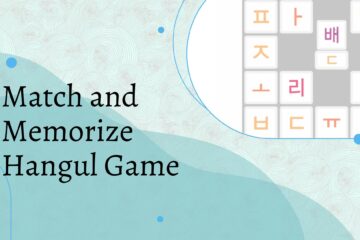Finishing off part one of my post about language exchange, where I talked about different apps to use and finding a partner. In this post I’ll give you a lot to work with- getting into what to talk about with a Korean language exchange partner. Plus some key vocab which you can use to work with as a starting off point! From introductions, talking about hobbies, asking questions and more.

Deciding on Feedback
Now obviously both you and your partner will make some common mistakes; which is great if you can learn from them. So you need to decide how you want to give/receive feedback.
Some apps have inbuilt features for this like Hellotalk but if you’re using a different place to chat like Discord it’s much more freeform. Also, I feel like in person it’s very helpful to set up the structure. Does someone correct you right away? After the topic/conversation? Make corrections on everything or only big mistakes?
Some people might prefer only corrections on big mistakes; but for minor slip-ups like a typo they would rather move on. Corrections can also depend on what you want to work on, especially in Korean. Do you want to practice with formalities? Maybe try out a work or school-related conversation? How you would talk to a friend vs professor vs boss can really differ.
But really talking about how each of you want corrections helps the process go much smoother. It can feel awkward when someone messes up and you doubt if you should correct them thinking like “I understood what they meant so I guess that’s okay” when really they would have wanted the correction!
Language Exchange Partner Self-Introduction
Now getting into it I’ll give you some phrases and some keywords to use for talking to your language exchange partner. I’ll use __ throughout for places where you can fill in the blank and put your name, hobbies, etc.
안녕하세요: Hello
만나서 반가워요: Nice to meet you
저는 ___입니다: I’m __ / My name is __
저는 ___에 왔어요: I live in __
어디에서 왔어요?: Where are you from?
캐나다: Canada
미국: America
멕시코: Mexico
영국: England
독일: Germany
프랑스: France
러시아: Russia
호주: Australia
태국: Thailand
필리핀: Philippines
중국: China
일본: Japan
저는 __년 한국어를 공부했습니다: I’ve been studying Korean for __ years
잘 부탁드립니다: Take good care of me/I look forward to working with you
잘 부탁드립니다 doesn’t really have a clear 1 to 1 English translation, but it’s generally said when starting a formal relationship or any business with someone. So the context can range from a new tutor, job, company, etc. If you’ve seen behind the scenes clips of kdramas or idols filming their music videos you’ve probably heard it. It’s also very similar to よろしくお願いします if you know Japanese!

What to Talk About?
Obviously hobbies are a nice way to make a connection and get the conversation flowing. From music, movies, sports, art, and more. Depending on where you connect with your partner you might already know what interests you have in common before going into it.
But really the one thing you can always fall back on- that you’d have in common with any partner is your interest in each others language and country! Talk about interesting things you’ve learned about Korea or they’ve learned about your country/language, events and traditions, favourite Korean foods, and more. There can be endless things to pull from about Korea as a topic, that can also help you better understand the language as well.
취미가 뭐에요?: What are your hobbies?
저의 취미는 __과/와 __입니다: My hobbies are __ and __
저의 취미는 __입니다: My hobby is __
__ 좋아합니다: I like __
독서: reading
요리: cooking
등산: hiking
캠핑: camping
수영: swimming
축구: soccer
농구: basketball
테니스: tennis
뜨개질: knitting
그림 그리기: drawing
음악 만들: making music
Quick Tip: Keeping the Conversation Flowing
Everyone has experienced this scenario:
“Hey”
“Hi”
“How are you?”
“Good, how about you?”
“I’m good too”
…………….. (eternal silence and you never speak again)
And I get that it can be a lot harder to keep things going in a new language too! So fundamental rules I stick with to keep things going are no short answers, ask questions, and show interest. Here’s an example:
“How are you?”
“Good, just watching xx show right now. How about you, what are you up to?”
Asking a question that leads to more than just a short answer or yes/no is great. And even if someone says something you don’t know about you can probably find something to comment on about it. The internet is your tool you can look it up and go along, asking something related like:
“Oh my friend really likes xx show-”
“Is xx show like yy show? I like that genre and-“
But of course, conversation is a 2 way street. If they give you nothing to work with or don’t want to engage always giving short replies you can stop. There will always be other people out there to talk with and find a better connection!

Some Key Expressions and Phrases
It’s going to happen sometime; they speak too fast or use a word you don’t know and you’ll be lost. Here are some phrases and expressions to help you pause and better understand:
잠깐만요/잠시만요: Just a moment
질문있어요: I have a question
__ 뭐예요: What is __?
이거 뭐예요: What is this?
__ 한국어로 뭐예요: What is __ in Korean?
이제 이해해요: I understand now
다시 한번 말해 주세요?: Can you say that again?
좀 더 천천히 말해 주세요?: Can you speak a bit slower?
뭐?/뭐라고?/네?: Huh?/What?
Filler Words & Getting Your Point Across
At least for me, I even blank on words in English haha. So knowing Korean filler words to grab the word you’re forgetting and words/phrases to better explain what you’re going for is helpful. Take your time though and remember that you both are in a similar position; so it’s okay to make mistakes and feel a bit awkward.
음/어/그..: Uhm..
뭐지/뭐더라/뭐랄까..: What was it..? (thinking out loud, when you can’t remember something)
그게..: That is..
그러니까..: I mean..
참!: Oh! (like “oh! I remembered something-“)
__을/를 닮았어요: Resembles __
__의/과 반대쪽: Opposite of __
__의/과 같은: The same as __
__는 느낌어요: Feels like __
__가 아니라 __: Not __ but __
__가 아니라 __ 느낌어요: Not __, it feels more like __
__과 마찬가지로: Like __/ Similar to __
Ending a Session With Your Language Exchange Partner
Lastly as a call or meetup wraps up here are some phrases to use to say goodbye! I hope this all helps you get started and fell confident starting out language exchange.
감사합니다: Thank you
안녕히 주무세요: Good night
좋은 하루 되세요: Have a good day
나중에 봐요: See you later
저는 곧 떠나야 해요: I have to leave soon
저 먼저 가요: I’ll go first
조심히 가세요: Get home safe
안녕히 가세요: Goodbye (when they leave first)
안녕히 계세요: Goodbye (when you leave first)



0 Comments